Environment
Short Takes
Georgia’s new data center rule increases local controlDecember 1, 2025
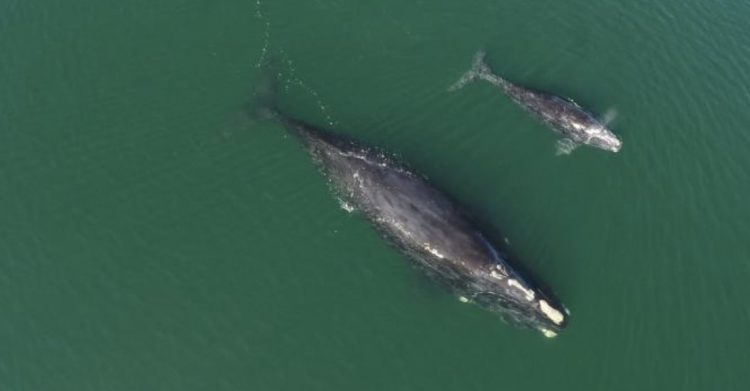
By David Pendered
Aug. 2 – No black letter law guides the U.S. Army Corps of Engineers’ decisions over how to balance the reproductive schedules of sea turtles and North American right whales with the calendars of dredging companies that help keep Georgia’s ports open for business.
The animals’ reproductive schedules leave about a dozen weeks a year when dredges could operate without threatening the life cycle of endangered species of sea turtles, or the nearly extinct North American right whales. The issue arose again in July, when the Corps decided to shift a dredging operation to wintertime.
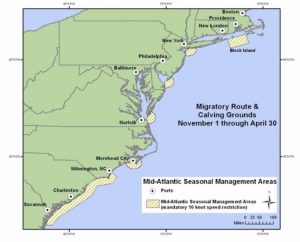
Now NOAA has entered the conflict. On Monday, the agency posted new proposals to safeguard right whales and gave the public through Sept. 29 to comment. Three informational seminars are scheduled, on Aug. 10, Aug. 16 and Aug. 24. The proposal involves reducing speed limits on vessels that are smaller than those now required to slow down in certain areas at certain times of the year. The proposed change would reduce one of the two leading causes of right whales’ death and injury – being hit by a vessel traveling too fast to avoid striking animals that are difficult to see from a distance because they don’t have a dorsel fin protruding above the sea surface and their body color blends in with the water, or entanglement in commercial fishing gear.
The Corps is in the middle of this turbulence.
The Corps is charged with maintaining access between the high seas and the nation’s ports. In Georgia, this means removing sand that accumulates on the bottom of fairways and harbors, sand that could make the waters too shallow for cargo ships to reach the ports of Savannah and Brunswick. The process often involves dredging sand to the surface and depositing it on land.
Almost regardless of when dredging is conducted in Georgia, the action is almost certain to run afoul of right whales delivering babies or sea turtles coming to lay eggs in nests on barrier islands, or returning to sea after nesting. The newborns also are at risk.
In the winter, dredging endangers right whales who travel South to deliver their babies in the warmer waters off the coastlines of Georgia and northern Florida. Calving season runs from mid November to mid-April.
In the spring and summer, dredging endangers sea turtles who flock to Georgia’s barrier islands to lay eggs. Nesting season runs from late May to mid August.
The Corps on Tuesday provided a lengthy response to questions that stem from a dredging schedule decision announced in July – which pushes a potential summer dredging action into the winter.
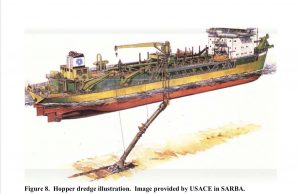
The first question involved the reason the Corps postponed a potential dredging operation at the Port of Brunswick, from summer, the sea turtle nesting season, to winter, the right whale birthing season.
Second was how this decision comports with language to protect the right whale calving season that’s specified in an agreement the Corps signed in 2020. A section on page 645 states: “The negotiations resulted in an agreement to shift a portion of hopper dredging to summer months when North Atlantic right whale are not present in the action area….” The agreement is the 2020 South Atlantic Regional Biological Opinion for Dredging and Material Placement Activities in the Southeast United States (2020 SARBO).
Finally, one issue that wasn’t part of a question involves a memo signed by the commander of the Savannah Corps in 2021. The memo outlines the Corps’ response to a federal lawsuit involving sea turtle nesting and harbor dredging. The document dated July 13, 2021 states that no hopper dredging will be conducted in the Brunswick or Savannah harbors “except from 15 December – 31 March.” The order appears to contradict protections for right whales as specified in the 2020 SARBO.
Cheri Pritchard, the Corps’ senior public affairs specialist and media operations chief in Savannah, wrote in an email that the Corps’ intention is to provide as much information as possible regarding the Corps’ decision-making process in order to help readers better understand the Corps’ process. Pritchard took office in Nov. 1, 2021, succeeding Billy Birdwell, who retired after almost 19 years in the Savannah office.
Here are the complete responses Pritchard provided:
Answer 1)
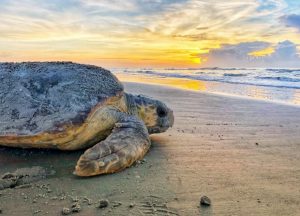
Answer 2)
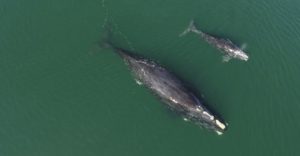
0